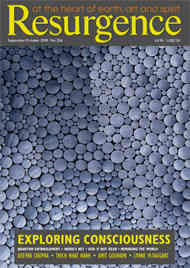What is Consciousness? The Oxford English Dictionary defines 'consciousness’ as "knowing together… mutual knowledge… the state of being conscious, as a condition and concomitant of all thought, feeling and volition”.
It is a broad and wide definition.
The Sanskrit word for 'consciousness', chit, is even broader and wider. From the perspective of Indian philosophy chit (consciousness) is the ground of all being. Everything is primarily consciousness, including the material world. Humans, animals, plants, mountains, rivers and oceans rest on two realities: the external reality of the physical elements, and the internal reality of consciousness which makes the whole Earth a living organism. In this view, consciousness is more than a human attribute: it is the most fundamental and the most essential quality of all existence.
The great Hindu sage and philosopher Vasistha speaks to Rama thus: “Consciousness is beginningless and eternal. Mind, matter and life emerge out of and submerge into consciousness. All life is linked through consciousness. The universe exists in consciousness as an image of Shiva exists in a stone."
Consciousness exists within and without; time and space, too, are within consciousness. As we cannot separate a flower from its fragrance, we cannot separate existence from consciousness. It is the intrinsic and quantum quality of all beings. Pure consciousness is pure energy; here consciousness and quantum mechanics meet.
Consciousness is the stage upon which the drama of the world unfolds. Consciousness is the blue sky within which the black, white and red clouds rush around. Consciousness is the canvas upon which we paint the big picture of the universe. The words 'canvas', 'ground', 'stage' and 'sky' are merely metaphors because they, too, are an integral part of consciousness. Manifest and unmanifest, visible and invisible, all and everything is consciousness. When we realise this then there is nothing to own, nothing to possess, nothing to fight for, and nothing to boast about.
The Indian philosophers called it satchitananda which means 'the reality of consciousness is filled with bliss'.
Let us celebrate consciousness as joy, pleasure and delight. Let us experience consciousness as harmony where we are all connected; we are all related within Indra’s net.
Consciousness is not merely a philosophical or scientific theory: it is a living reality. At this moment in time we need this realisation more than ever. We need to make a transition from an ego-centred worldview to an eco-centred worldview; from ignorant and wasteful ways of living to an elegant, simple and respectful way of living: transition from dependence on coal, nuclear and oil to a relationship with water, sun and soil; transition from a desire to control and dominate to an intention to relate, participate and celebrate. Crises and conflicts arise when we are out of touch with the reality of consciousness. Peace and prosperity prevail when we are alive to consciousness.
It may appear that exploration of consciousness is an esoteric area. Our readers might wonder why we are devoting an issue of Resurgence to the question of consciousness rather than addressing areas of practical action for change. But in taking action without looking deeply at our perceptions and worldviews, we may be in danger of leaping from the frying pan into the fire. Therefore, to address the profound needs of our time a fundamental paradigm shift is required: a shift from materialism to conscious living. That is why we have brought together some leading thinkers and writers to dig deep and reach the spiritual as well as the scientific source of wisdom. Are we ready for a quantum leap?
SATISH KUMAR








